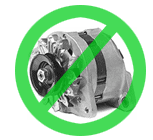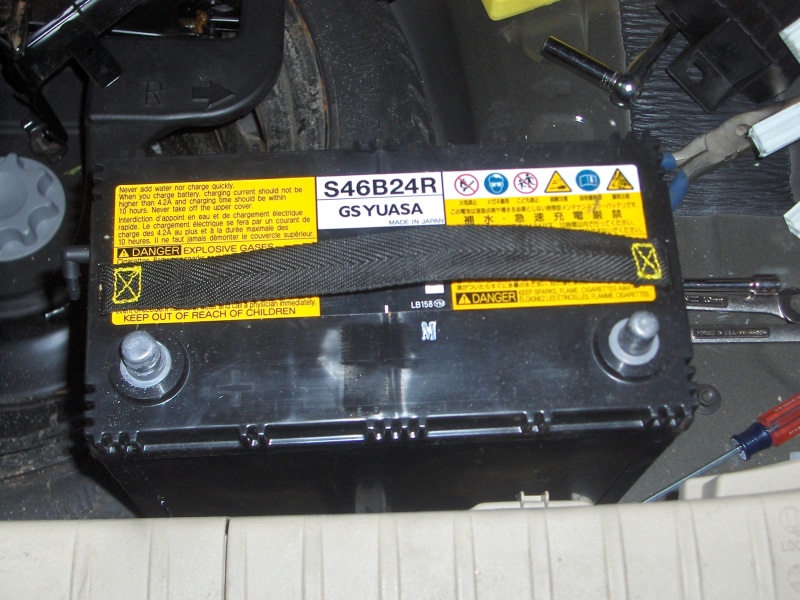
I have recently found out that the battery in
my Metro doesn't have a ton of life left in it. Being an ecomodder, I instantly think this is a great time to do an alternator delete mod. So, I figured I'd go through the steps of figuring out how to actually do an alternator delete for anyone who doesn't know already.

Step one is to figure out how much power your car uses so you can size your battery correctly. This is probably the trickiest part to do. The best way to do this is to measure your electrical power consumption with an ammeter. However, for those who don't have an ammeter, Darin
posted a great thread on electrical loads a while back which I'm quoting below. Its a pretty comprehensive list, and your car likely doesn't have all these goodies. The Metro sure doesn't. However, you do want to calculate a worst case scenario to size your battery so you know you have enough power no matter what. If you compromise on battery capacity, you'll have to keep that in mind as you drive daily.
Code:
Engine Management Power (W)
Fuel Pumps Injectors 135
Ignition System 60
Electronic Throttle Sys. 60
Sensors a Actuators 110
Solenoids & Relays 20
Subtotal Engine 385
Amps @ 14.2V 27.11
Chassis Electrification Power (W)
Electric assist steering 300
ABS brake system 200
Air suspension valves 50
Air compressor 500
Subtotal Chassis 1050
Amps @ 14.2V 73.94
Charging System Power (W)
Alternator 3000
Battery (80 Ah) 1000
Starter motor 2200
Multimedia & HVAC Power (W)
High end audio sys. 300
Navigation and GPS 150
Driver information display 30
Cabin climate valves 75
Blower motor + ECU 370
Subtotal Cabin Sys. 925
Amps @ 14.2V 65.14
Lighting (Exterior & Interior) Power (W)
Headlamps (2) 120
Running/Park lights (4) 130
Turn signal lamps 130
Center high mount stop 65
Back-up, interior, license 45
Subtotal lighting 490
Amps @ 14.2V 34.51
Body Electrical Power(W)
Power Windows (4) 560
Power Door Locks (4) 200
Wipers and washers 140
Heated backlight 500
Power seats (2) 460
Subtotal Body Sys. 1860
Amps @ 14.2V 130.99
Future Systems Power(W)
DVD and in-seat displays
MicroJMild-hybrid functions
Active suspension
Frontyrear radar
Obstacle detection & Airbags
Active cruise control
Total Electrical/Electronics 4710
For my specific case, I know the exact electrical loads thanks to Darin and others on this forum.
Here is an exact list of electrical loads for the Metro.
So, for my example lets add them up to get a worst case. My worst case scenario is a winter commute of ~15 miles per day. This equates to roughly 30 minutes of driving. Obviously the engine must be running for some of this, and the engine pulls roughly 140W or 10A. Since its winter, I want heat, so my fan will be on some of the time. I'll use fan setting 3/4 for 140W or 10A. Its also dark out, so my lights will be on which uses 240W or 20A. The total for these loads is 40A.
This means I'm using 40A for 30 minutes. Battery capacity is rated in amp hours (Ah). So, if I use 40 amps for a half hour, I've used 20 Ah. This would be just enough power to get me to work and back under a typical bad weather scenario. However, I do take the occasional trip that is longer than 15 minutes, and what if I want to run some errands after work? Well, we need more capacity.
In my case, I don't use the Metro for long hauls. But, I go to occasional lunch meeting and what not. So, I would like to aim for 1-1.5 hours of run time. Using the above calculation, for 1.5 hours of run time at 40A, I need 60Ah of battery capacity.
So, I need 60Ah of usable battery capacity. If I go with lead acid (which I probably will), the rule of thumb for optimum battery life is to not exceed 50% depth of discharge (DOD). This means don't discharge the battery beyond half of its capacity. Now, for 60Ah of usable capacity, I need a 120Ah battery. This is what I should be aiming for. Quite a far cry from the 20Ah I initially calculated.
If you wanted to get fancy and go with lithium, their rule of thumb for DOD is 70-80%. This means you'll only need a 80-90Ah battery.
Sizing the battery in this manner will ensure that you have enough power to get around without the alternator without worrying about it, and it will also ensure that your battery will live a long happy life without you abusing it.
So, that is step one.
A 120Ah battery is fairly large, so we'll see what I can actually fit into the engine bay of the Metro. I may compromise and drop down to a smaller battery and just use the alternator for those longer trips, then turn it off on the way home.